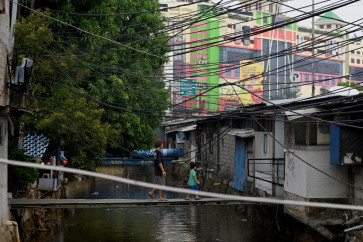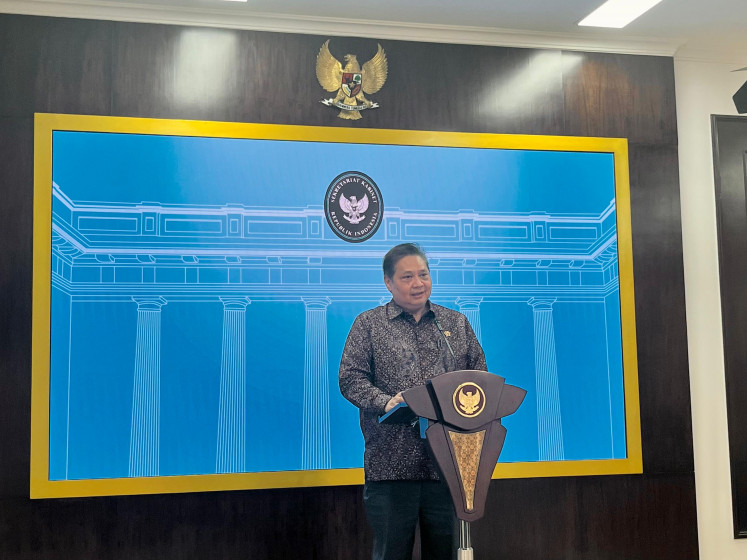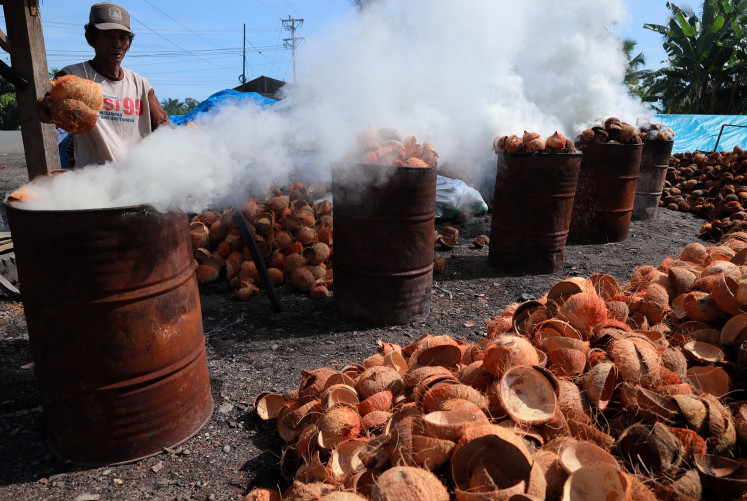Kalbe Farma ventures into clinical laboratory business
Health check: Toyota Tsusho Corporation managing executive officer Takeshi Matsushita (right) is joined by (from left) PT Kalbe Farma president director Vidjongtius, PT Innolab Sains Internasional president commissioner Sie Djohan, and Hoken Kagaku Kenkyujo Inc
Change text size
Gift Premium Articles
to Anyone

H
span class="caption">Health check: Toyota Tsusho Corporation managing executive officer Takeshi Matsushita (right) is joined by (from left) PT Kalbe Farma president director Vidjongtius, PT Innolab Sains Internasional president commissioner Sie Djohan, and Hoken Kagaku Kenkyujo Inc. president and CEO Yoshizoh Kugawa during the launch of the Kalgen Innolab laboratory in Jakarta on Thursday. (ANTARA/Audy Alwi)
Major pharmaceutical manufacturer Kalbe Farma has formed a joint venture company with two Japanese firms to enter a new line of business in clinical laboratory services.
Kalbe, through its subsidiary, established PT Innolab Sains Internasional, a 60:20:20 joint investment by Kalbe, the Health Science Research Institute (HSRI) and Toyota Tsusho Corporation.
The new clinical laboratory located in North Jakarta — named Kalgen Innolab — will offer basic to advanced medical tests including general health check-ups and tests on blood profile and the detection of DNA/RNA levels.
“We need advanced technology with high standards to develop high-quality clinical laboratory services. That’s why we decided to partner with HSRI and Toyota,” Kalbe Farma president director Vidjongtius said.
For the initial stage, the company invested between Rp 50 billion (US$3.5 million) and Rp 100 billion. Kalbe is hoping the new business will contribute up to 10 percent to its total revenue in the next five years.
Next, as its expansion strategy, Kalbe is also set to help hospitals manage their laboratories more efficiently with Japanese quality standards.
Kalbe formed the joint venture to provide “direct contact” to customers through healthcare services.
Nevertheless, Indonesia, a highly populated country with escalating health problems, will need to focus on expanding health treatments.
Proper diagnosis through laboratory testing, as provided by its clinical laboratory, could help in disease prevention, shorten treatment time or even help to cut unnecessary costs.
“In the future, complete, accurate and timely diagnosis will become very crucial to give precise treatments,” PT Innolab Sains International president commissioner Sie Djohan said.
From the Japanese firm’s point of view, Indonesia is an attractive market because it has followed the shift in disease patterns in the country from infectious diseases to lifestyle-related diseases, which require more advanced clinical testing.
HSRI said it entrusted Kalbe to be its partner because it had been a leading player in the country with extensive networks and market access, and also due to the fact that Kalbe owns a subsidiary called Kalbio Global Medika (KGM), which engages in biotechnology manufacturing.
“The clinical laboratory business in Japan will face a big challenge as Japanese’s population is shrinking down. That’s why we tried to find the opportunity to expand overseas,” HSRI president and CEO Yoshizoh Kugawa said.
Kalbe operates within four lines of business, namely prescription drugs; health products, with local brands Promag and Extra Joss; nutritional products, with Prenagen and Entrasol; and distribution and logistics.
The firm’s revenue grew by single digits last year amid the slowdown in people’s purchasing power and the weakening of the rupiah, which strongly impacted its financial performance as a majority of raw materials for drug production were imported.
Despite declining to reveal last year’s target, Vidjongtius projected that this year’s revenue growth would be at around 8 percent, unchanged from the 2017 target.
Kalbe’s financial report revealed revenue growth of 5 percent to Rp 15.09 trillion as of the third quarter of 2017. Its net profit rose slightly, by 4.51 percent to Rp 1.78 trillion.
“We remain cautiously optimistic amid the political year, but we will continue with our initiatives to launch new products and invest in new factories,” Vidjongtius said.
The company allocated Rp 1 trillion to Rp 1.5 trillion in capital expenditure in 2018, partly to expand factories located in Cikarang, West Java, and Pulogadung, East Jakarta.









